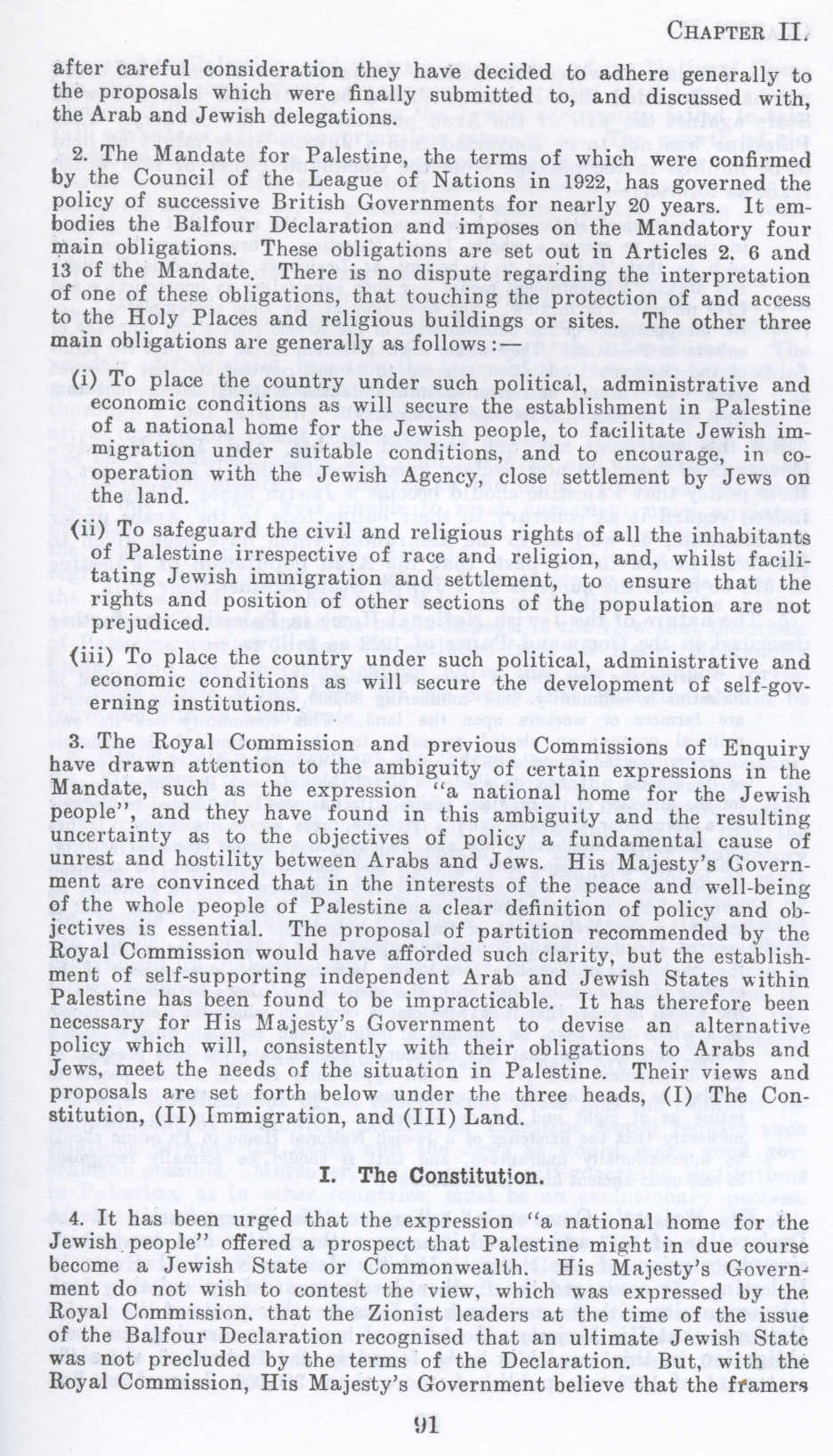| Prev | Next |  |
| Prev | Next |
| PalestineRemembered | About Us | Oral History | العربية | |
| Pictures | Zionist FAQs | Haavara | Maps | |
| Search |
| Camps |
| Districts |
| Acre |
| Baysan |
| Beersheba |
| Bethlehem |
| Gaza |
| Haifa |
| Hebron |
| Jaffa |
| Jericho |
| Jerusalem |
| Jinin |
| Nablus |
| Nazareth |
| Ramallah |
| al-Ramla |
| Safad |
| Tiberias |
| Tulkarm |
| Donate |
| Contact |
| Profile |
| Videos |
British Mandate: A Survey of Palestine: Volume I - Page 91. Annexure II: The White Paper of May, 1939-Statement of Policy. Constitution |
Disclaimer
The above documents, article, interviews, movies, podcasts, or stories reflects solely the research and opinions of its authors. PalestineRemembered.com makes its best effort to validate its contents.


Post Your Comment
*It should be NOTED that your email address won't be shared, and all communications between members will be routed via the website's mail server.
after careful consideration they have decided to adhere generally to the proposals which were finally submitted to, and discussed with, the Arab and Jewish delegations.
2. The Mandate for Palestine, the terms of which were confirmed by the Council of the League of Nations in 1922, has governed the policy of successive British Governments for nearly 20 years. It embodies the Balfour Declaration and imposes on the Mandatory four main obligations. These obligations are set out in Articles 2. 6 and 13 of the Mandate. There is no dispute regarding the interpretation of one of these obligations, that touching the protection of and access to the Holy Places and religious buildings or sites. The other three main obligations are generally as follows:-
(i) To place the country under such political, administrative and economic conditions as will secure the establishment in Palestine of a national home for the Jewish people, to facilitate Jewish immigration under suitable conditions, and to encourage, in cooperation with the Jewish Agency, close settlement by Jews on the land.
(ii) To safeguard the civil and religious rights of all the inhabitants of Palestine irrespective of race and religion, and, whilst facilitating Jewish immigration and settlement, to ensure that the rights and position of other sections of the population are not prejudiced.
{iii) To place the country under such political, administrative and economic conditions as will secure the development of self-governing institutions.
3. The Royal Commission and previous Commissions of Enquiry have drawn attention to the ambiguity of certain expressions in the Mandate, such as the expression "a national home for the Jewish people", and they have found in this ambiguity and the resulting uncertainty as to the objectives of policy a fundamental cause of unrest and hostility between Arabs and Jews. His Majesty1s Government are convinced that in the interests of the peace and well-being of the whole people of Palestine a clear definition of policy and objectives is essential. The proposal of partition recommended by the Royal Commission would have afforded such clarity, but the establishment of self-supporting independent Arab and Jewish States within Palestine has been found to be impracticable. It has therefore been necessary for His Majesty's Government to devise an alternative policy which wi11, consistently with their obligations to Arabs and Jews, meet the needs of the situation in Palestine. Their views and proposals are set forth below under the three heads, (I) The Constitution, (II) Immigration, and (III) Land.
I. The Constitution.
4. It has been urged that the expression 11a national home for the Jewish people" offered a prospect that Palestine might in due course become a Jewish State or Commonwealth. His Majesty’s Government do not wish to contest the view, which was expressed by the Royal Commission. that the Zionist leaders at the time of the issue of the Balfour Declaration recognised that an ultimate Jewish State was not precluded by the terms of the Declaration. But, with the Royal Commission, His Majesty1s Government believe that the framers
Page 91